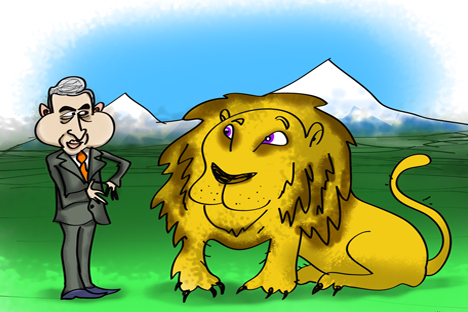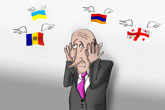Russia secures positions in the South Caucasus

Click to enlarge the image. Drawing by Niyaz Karim
For many years, Russian-Armenian relations were considered an example of a strong and chaste friendship. In fact, Russian military and border guards are involved in ensuring the national security of Armenia. Russia is a member of the OSCE Minsk Group on the Nagorno–Karabakh conflict, having its own ability to conduct negotiations.
The Russian business presence in Armenia is also impressive. Last year, Russian investments accounted for half of the total volume of foreign investments in the country.
However, in the past two months, relations between Yerevan and Moscow have resembled a kind of alienation. Until the very last moment, the recent visit by Armenian President Serzh Sargsyan to the Russian capital was under discussion, as well as a meeting and talks with Russian President Vladimir Putin.
Interest in the topic has been supported by the contributions of numerous experts, journalists and politicians, both in Moscow and Yerevan.
At the same time, the leaders of the two countries refrained from comments and harsh evaluations during the Armenian president’s visit. In fact, there was a simultaneous layering of several thorny issues, ensuring their transition into a discussion about the quality of the relationship between the strategic allies.
On the one hand, Moscow, being extremely jealous about any penetration into the post-Soviet space by European and American interests, showed concern about the signing of the Association Agreement between Brussels and Yerevan, which is to take place in November at the upcoming Eastern Partnership Summit in Lithuania.
In this case, unlike its integration in security forums (i.e., the CSTO), Armenia did not show particular interest in participating in the Customs Union, and some of its officials even expressed skepticism about a union of countries that have no common state border.
On the other hand, Armenia has been worried about the growing military-technical cooperation between Moscow and Baku: Even an ordinary Armenian voter expressed dissatisfaction with rising prices for Russian gas supplied into the Caucasus republic.
It should be noted that all of these topics in the relations between the two countries have come up in the past. However, their connection in time has given the aforementioned negative effect.
Related:
Russia, Georgia in no hurry to normalize relations
It is no secret that Moscow has used leverages to exert pressure on its ally. Yet it would be wrong to explain the current compliance of Sargsyan solely by the "maneuvers" of Moscow.
Yerevan understands as well as the others that the European vector, with all its visual appeal today, does not compensate the role that Russia provides for the security of the country and in ensuring of the status-quo in the Nagorno–Karabakh peace process.
The EU also has a serious lack of “hard power.” In addition, the European strategic partnership with a longtime rival of Armenia — Baku — in the field of energy does not incline Brussels to accept only the "truth" of Yerevan.
Considerable risks are also associated with a possible intervention in Syria and, in particular, with the potential willingness of Turkey to intervene in the civil conflict in this Middle East country. No one can guarantee that Ankara will not act tougher against Yerevan, leaving the latter without Russian support. From hence comes the rather pragmatic choice of Sarkisian.
Should Moscow be celebrating a triumph? Well, yes and no. On the one hand, it has once again proved the stability of its interests in Eurasia, in general, and in the South Caucasus, in particular.
Russia does not need to rebuild its regional policy, and the loyalty of its strategic ally has been confirmed. On the other hand, Sarkisian’s choice in September is not the end of the history but the start of a new phase.
It will therefore be interesting to see the reaction of Europe, the United States and other neighboring countries of Armenia (i.e., Iran and Turkey). Much will depend on the tone of Russia’s subsequent discourse.
After all, keeping such an ally as Armenia is beneficial for Moscow also. It is not only in Armenia’s interests. It is extremely important that Russian politicians and diplomats refrain from reveling in victory and operating on the principle of "you can’t run away from us." It is not enough to declare an appeal. It is important to be attractive in reality—and not only in the sphere of security and defense.
Sergei Markedonov is a visiting research associate at the Center for Strategic and International Studies in Washington, D.C.
All rights reserved by Rossiyskaya Gazeta.
Subscribe
to our newsletter!
Get the week's best stories straight to your inbox


